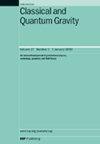Accelerating numerical relativity with code generation: CUDA-enabled hyperbolic relaxation
IF 3.7
3区 物理与天体物理
Q2 ASTRONOMY & ASTROPHYSICS
引用次数: 0
Abstract
Next-generation gravitational wave (GW) detectors such as Cosmic Explorer, the Einstein Telescope, and LISA, demand highly accurate and extensive GW catalogs to faithfully extract physical parameters from observed signals. However, numerical relativity (NR) faces significant challenges in generating these catalogs at the required scale and accuracy on modern computers, as NR codes do not fully exploit modern GPU capabilities. In response, we extend NRPy, a Python-based NR code-generation framework, to develop NRPyEllipticGPU—a CUDA-optimized elliptic solver tailored for the binary black hole initial data problem. NRPyEllipticGPU is the first GPU-enabled elliptic solver in the NR community, supporting a variety of coordinate systems and demonstrating substantial performance improvements on both consumer-grade and HPC-grade GPUs. We show that, when compared to a high-end CPU, NRPyEllipticGPU achieves on a high-end GPU up to a sixteenfold speedup in single precision while increasing double-precision performance by a factor of 2–4. This performance boost leverages the GPU’s superior parallelism and memory bandwidth to achieve a compute-bound application and enhancing the overall simulation efficiency. As NRPyEllipticGPU shares the core infrastructure common to NR codes, this work serves as a practical guide for developing full, CUDA-optimized NR codes.用代码生成加速数值相对论:cuda支持的双曲松弛
下一代引力波探测器,如宇宙探测器、爱因斯坦望远镜和LISA,需要高度精确和广泛的引力波目录,以忠实地从观测信号中提取物理参数。然而,数字相对论(NR)在现代计算机上以所需的规模和准确性生成这些目录时面临着重大挑战,因为NR代码不能充分利用现代GPU功能。为此,我们扩展了基于python的NR代码生成框架NRPy,开发了针对二元黑洞初始数据问题定制的cuda优化椭圆求解器nrpyellipticgpu。NRPyEllipticGPU是NR社区中第一个支持gpu的椭圆求解器,支持各种坐标系统,并在消费级和hpc级gpu上展示了实质性的性能改进。我们表明,与高端CPU相比,NRPyEllipticGPU在高端GPU上实现了高达16倍的单精度加速,同时将双精度性能提高了2-4倍。这种性能提升利用GPU卓越的并行性和内存带宽来实现计算约束应用程序并提高整体模拟效率。由于NRPyEllipticGPU共享NR代码共同的核心基础设施,因此这项工作可作为开发完整的cuda优化NR代码的实用指南。
本文章由计算机程序翻译,如有差异,请以英文原文为准。
求助全文
约1分钟内获得全文
求助全文
来源期刊

Classical and Quantum Gravity
物理-天文与天体物理
CiteScore
7.00
自引率
8.60%
发文量
301
审稿时长
2-4 weeks
期刊介绍:
Classical and Quantum Gravity is an established journal for physicists, mathematicians and cosmologists in the fields of gravitation and the theory of spacetime. The journal is now the acknowledged world leader in classical relativity and all areas of quantum gravity.
 求助内容:
求助内容: 应助结果提醒方式:
应助结果提醒方式:


